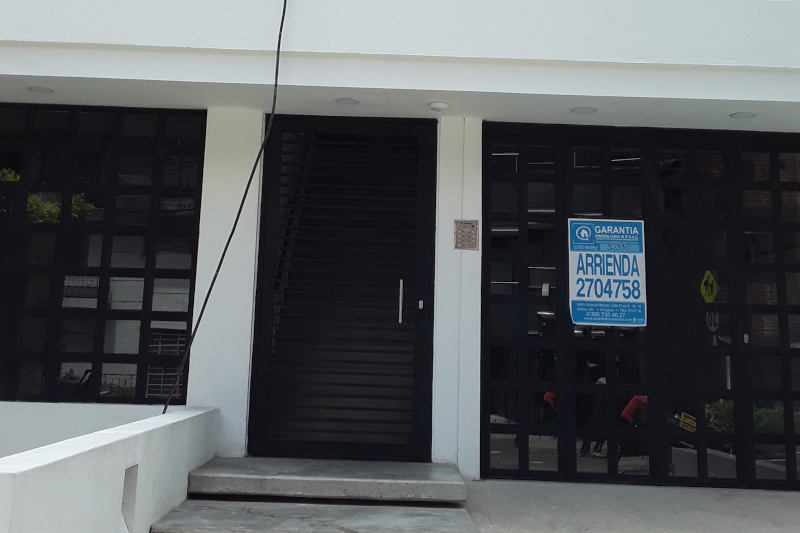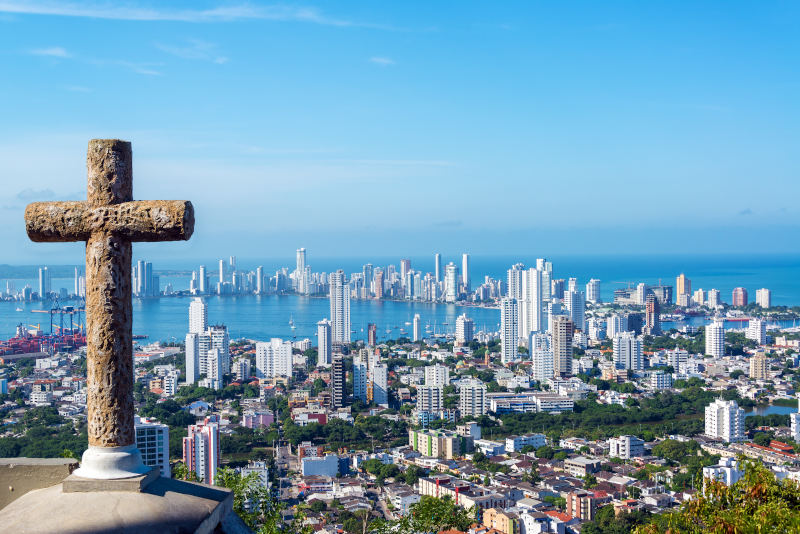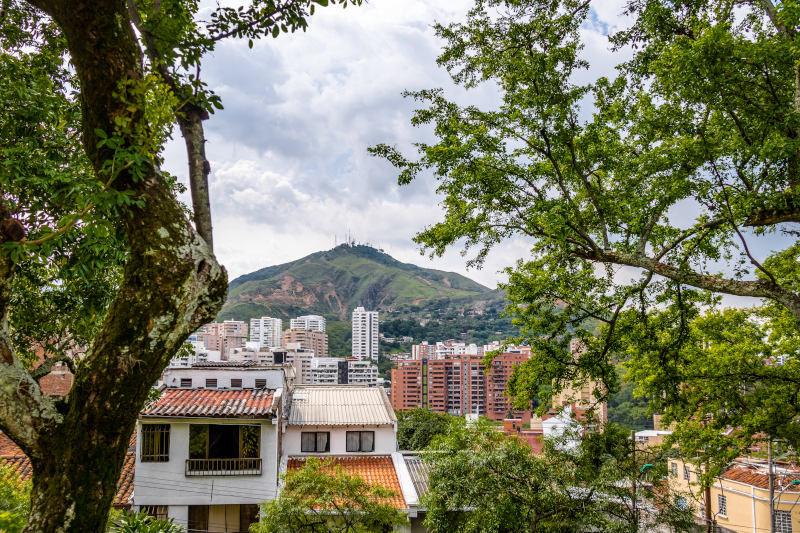Updated on September 7, 2022
Renting an apartment in Colombia for foreigners can be challenging. Much has been said on social networks on the topic including many falsehoods. This guide will tell you everything you need to know to successfully get a pad here!
Before we get into the nitty gritty, let’s underline that the vast majority of long term rental homes and apartments are available through rental agencies here. There is no MLS system and one agency’s listings may not be available at another.
The vast majority of rental properties in Colombia are unfurnished condominium apartments, with a much smaller number of townhouses and a even smaller number of standalone houses.
Most rental properties are owned by individuals rather than companies, and these owners take full advantage of the services offered by rental agencies for a reasonable cost: screening tenants, showing the property, handling rental payments, cleaning and repainting the property when the tenant moves out as well as pursuing tenants for any damages or unpaid rent. It’s an attractive proposition for property owners and this is why rental agencies dominate the market. despite not having any licensing or regulatory body above them. Anybody can start a real estate company in Colombia!
The screening process is a boon for the property owner, but a bane for renters, especially foreigners. The requirement for guarantors (fiadores), 3rd parties who will take it upon themselves to pay your rent or damages if you can’t is the fly in the ointment for most: These fiadores might include one that has a demonstrable monthly income that far exceeds the rent, and another who owns property valued at or more than the rental property. These requirements are the most difficult to meet and your own good credit standing in Colombia will not eliminate this hurdle. Your perfect FICO score in the USA means little here, just as your Colombian or Canadian credit rating would not be of any help in the USA.
Not being able to satisfy the fianza requirement is a big problem, as it will severely limit your choices. Here’s a list of possible solutions to your issue, which we’ll explore in greater detail further on:
- Ask Colombia based family and friends who own property / have large incomes to act as your fiadores.
- Rent from Colombia based family and friends who own property
- Rent directly from property owners who don’t know you
- No fiador apartments advertised in Facebook groups
- Obtain a Certificado de Disponibildad Presupuestal (CDP) through a local insurer
- Have the rental agency do an “estudio”
- Pay a 3rd party to act as fiador
- Rent a room instead of an apartment
Now let’s go over the above options in more detail…
Ask Colombia based family and friends who own property / have large incomes to act as your fiadores.
This is a big ask, as it has real world implications should you for any reason, fail to pay your rental or burn the place down! If your spouse is Colombian and his/her family has middle or upper class members, then there’s a very good chance they’ll agree. Friends: unless they’re long time friends, you probably shouldn’t ask!
Rent from Colombia based family and friends who own property
This is a great solution for foreigners, as many middle and upper class Colombian families and Gringos own rental properties. Renting it out to someone whom they trust, you, is a no-brainer for them and the usual requirements will be waived. The caveats are that the choice of barrios, gated communities or apartment quality and size may not suit you, in which case it would be a temporary solution. The other possible snag is if the unit is vacated already or if you’ll have to wait, in which case it’s possible the current tenants change their minds and decide to stay. Despite all the potential negatives, this is still a great solution as it avoids all the requirements, though you will still probably have to sign and authenticate (see our article about notaries) a 6 month to a year lease.
Rent directly from property owners who don’t know you
If there’s a sign in a property’s window, even if from an agency, it’s possible you could negotiate directly with the actual owner. An agency will not give you any information, but neighbors, or the guards at a gated community or building might help you get in contact with the owners. Even if there’s no agency, they could still demand that you provide fiadores, but just meeting them in person and them liking you might do the trick! Our recommendation is to not offer to pay a higher rent, or pay several months of rent in advance or a CDP (see further down) except as a last resort. Empathy may be all that’s required to get the same deal as a native Colombian would.
“No fiador” apartments advertised in Facebook groups
There seems to be a proliferation of (mostly) fully furnished executive apartments marketed directly to foreigners via Facebook groups, including groups dedicated to this type of rental. It’s our observation that these tend to be much higher priced than normal, often well above 10 million pesos a month. We urge caution when responding to this kind of post, as Facebook group members have reported being scammed in some cases. Wisdom dictates that you should never send money before physically visiting the apartment and signing a contract, as well as doing your due diligence regarding the agency or owner you’re dealing with. Only recommendations from people you trust should be taken seriously. As for rents, you can ask for a reduction.
Obtain a Certificado de Disponibildad Presupuestal (CDP) through a local insurer
A CDP is offered by a few insurers. It consists in paying them a bond, usually equivalent to 6 months of rent, which they’ll hold as a guarantee till you leave your apartment. This can tie up a lot of money for a long time, but interest is paid on it (if it’s not, change rental agencies!). If the rent is 2.5 million pesos, for example, a 6 month CDP will cost you 15 million pesos (over $3,500 US at time of writing). Caution is urged here to insure you’re dealing with a reputable insurer! Juan Carlos of Stellar View Realty in El Poblado, Medellín (www.stellarviewrealty.com) recommends Seguros Bolívar , which is what all agencies we consulted used. note: this does not constitute an endorsement and we urge you to always do your due diligence before signing or paying for anything
We checked with regular rental agencies and they also offer the possibility of a CDP in lieu of fiadores, something which was not possible just a few ago. Davivienda, one of the biggest banks in Colombia, is what many use, and in turn the bank insures your deposit through insurer El Libertador / Bolivar. In this scenario, it could be a CDP equivalent to 5 or 6 months of rent, depending on your credit history in Colombia.
Some expat blogs claim it’s a good idea to pay property owners a six month advance directly, but we urge more caution in this situation, as it may be extremely difficult to get your funds returned if the rental ends prematurely, thus we recommend using an insurer instead, even though this means the funds won’t be used against the rent during your lease.
SIDENOTE: It’s come to our attention that some rental agencies will suggest that you undergo a credit evaluation to determine if you qualify for a CDP of 5 or the default 6 months. This evaluation SHOULD be free at most agencies. If it’s not, we recommend you change agencies even if that means not being able to rent the property you wanted. By the same token, if the agency tells you the CDP will bear NO interest, you should NOT accept this, as it means the agency will be putting its name on the CDP.
Pay a 3rd party to act as fiador
There are companies offering fianza services. An admin at an expat Facebook group told us he was scammed by one such service, and although that doesn’t mean it will happen to you, we urge caution. Such services will usually provide a 3rd party guarantor. Make sure this is acceptable to the rental agency or property owners before signing on. Fees are usually a percentage of one month’s rent, or one month’s rent.
Juan Carlos (quoted in previous section) mentioned a brand name realtor (we have not yet received permission to say which) that will provide pre-approved fiadores for one month’s rent on their agency’s own listings, IF the actual property owner approves. This inspires more confidence in us and is one of the better options available to you. Again, rental / real estate agencies located in areas where foreigners tend to live are much more likely to offer this option. Ask them.
We recommend avoiding paying an individual directly to act as your fiador, for obvious reasons (we hope!)
Have the rental agency do an “estudio”
If offered by the rental agency, they can have something equivalent to a credit check done by an insurer, for example El Libertador, and depending on the results, it could mean no fiadores are required or a 5 month instead of a 6 month CDP.
The agency should be able to submit the estudio online with a minimum of information. You’ll be required to answer a few ID verification questions similar to what you would do in the USA or Canada.
This estudio should be FREE. Ask the agency if it’s free — if it’s not, go to one where it is.
Rent a room instead of an apartment
You can find rooms to rent, often with their own bathroom, both in Facebook groups and in real estate websites like Metro Cuadrado and Finca Raiz, among others. If you value your privacy, this isn’t a good option, but it tends to be the most economical and easiest solution for some, especially younger expats on a limited income, and it may be a great way to experience immersion!
Rental Contract Inclusions / Exclusions
Predial
The predial, or property tax, is normally included in the rental fee. If it isn’t, you should perhaps reconsider renting that property.
Utilities
Utilities in a typical unfurnished apartment long term contract are NOT included. Electricity, water, gas and sewage are your responsibility, but the bill you pay will be in the property owner’s name. The first bill will be for the previous tenant’s or the owner’s responsibility whereas the last that will arrive after you vacate will be yours. As contracts invariably start on the first of the month, if you move in on a different date, your share of the utilities should be prorated. You may want to consult our guide on paying bills in Colombia.
Administración
If you’re renting a condominium apartment of home, the “administración” fees as they’re known here may or may not be included, depending on the city where your rental is located. In the Medellín area, for example, it’s typically included, but in Cartagena, it’s not. The invoice will come in the owner’s name in your mailbox (usually at the “porteria” (entrance security) of your gated community or building) even though you are required to pay it.
Commission
Several years ago, the rental agency’s monthly commission was paid by the property owner out of your rent. Now the tendency is to have the tenant pay the first month’s commission + IVA sales tax. For example, one Medellín area agency’s commission is 22%, so on a 3 million peso rent, you will have to pay an extra 660,000 pesos + 19% for a total of over 785,000 COP upon signing the lease. 22%, incidentally, is on the high end, so you may want to shop around for rental agencies that charge less, but always keeping in mind that it should be one with a good reputation.
Cable / Internet
Almost certainly it will be your responsibility to obtain your own services through one of the providers with wiring in your building (Ex: Claro, Etb, Tigo)
Additional Resources
To help you in your search for your new pad, we’ve compiled a list of words and expressions you’ll encounter with explanations as to their meaning: HERE
SIDENOTE: This page will be updated from time to time as we get more intel, so you might want to bookmark it!
The above is copyrighted material. Republishing all or any part of it without the written expressed consent of Colombia Dreaming is strictly prohibited and any violation may result in prosecution. You may freely link to this page with the title, however.



